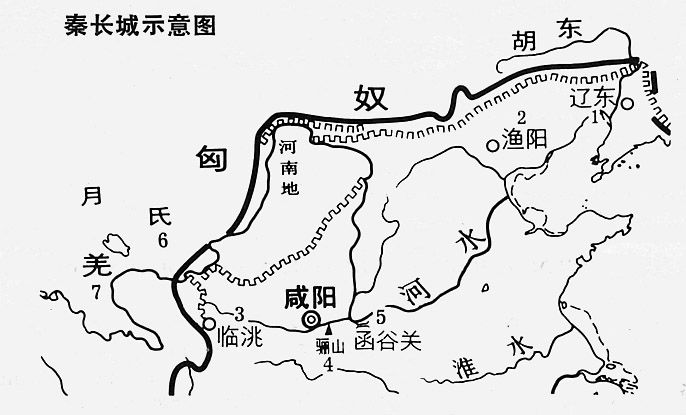秦长城
After Qin Emperor Shihuang unified China, he sent forces led by general Meng Tian to suppress the Huns, and gained much land.
秦始皇统一中国后,他派将军蒙恬为首的部队去镇压匈奴,并获得辽阔的土地。
In order to guard against the attacks from the Huns, Meng Tian led soldiers to build the world-renowned Great Wall.
为防范来自匈奴的攻击,蒙恬率领战士建造了举世闻名的万里长城。
In the Warring States Period (475----221B.C.), many states built the Great Wall as fortification.
在战国时期 (公元前475-221年),许多国家建造了长城作为防御工事。
The states of Qin, Zhao and Yan all once built some sections to resist the Huns invasions.
秦、赵、燕都曾建造部分长城以抵御匈奴入侵。
It was not until the Qin Dynasty (221----206B.C.) that Meng Tian connected the separate walls to form a defensive system on the northern border.
直到秦朝(公元前221----206年)蒙恬才将分散的墙壁连接起来,在北部边境形成了一个防御性的系统。
It took about nine years to finish and the wall stretched from Lintao (in the eastern part of today’s Gansu Prov-ince) in the west to Liaodong (in today’s Jilin Province) in the east.
这个庞大的工程耗费了九年的时间才得以完成,长城从临洮(今甘肃省东部) 西部一直延伸到辽东(今吉林省)东部。
The 5 000-kilometer-long wall not only served as a defense in the north but also symbolized the power of the emperor.
绵延5000公里的长城不仅仅是北方的防御工事,更代表着帝国的权力。
Further construction and extensions were made in the successive Han (206B.C.----220A.D.), Northern Wei (386----534), Northern Qi (550----577) and Sui (581----618) dynasties.
其后的汉朝(公元前206年----公元220年),北魏(386----534)北齐(550----577)以及隋朝(581----618)都对长城进行了进一步的修缮和扩建。
And in terms of both length and quality, the later constructions were better than that made in Qin.
无论从长度还是质量上来看,这些后世的工程都比秦朝的要精良得多。
The present Great Wall in Beijing is mainly remains from the Ming Dynasty (1368----1644).
现今在北京保存下来的长城主要是明长城。
During this period, bricks and granite were used when the workers laid the foundation of the wall and sophisticated designs and passes were built in the places of strategic importance.
明朝时,石砖和花岗岩被用于建造长城的地基部分,而精密复杂的设计和关口则被建造在有重要战略意义的位置。
To strengthen the military control of the northern frontiers, the Ming authorities divided the Great Wall into nine zones and placed each under the control of a Zhen (garrison headquarters).
为加强对北方边境的军事控制,明朝廷将长城分为九个区,将其安排在每个镇 (驻军总部)的控制下。
The Ming Wall starts from Yalujiang River (in today’s Heilongjiang Province), via today’s Liaoning, Hebei, Inner Mongolia, Shanxi, Shaanxi, Ningxia, to Guansu.The total length reaches 12700 li (over 5 000 kilometers).
明长城东起鸭绿江(今黑龙江省境内),经过辽宁、 河北、 内蒙古、山西、陕西、宁夏,绵延12700里(超过5000公里),西止甘肃。
The Shanhaiguan Pass and the Jiayuguarv Pass are two well-preserved passes at either end.
山海关和嘉峪关市迄今保存相对完好的两个关口,它们坐落在长城的两端。

Its height varied from 5 to 10 meters and watch houses were built every 130 meters.
长城的高度在5到10米之间,每隔130米就有一个瞭望塔。
If enemies came to invade, hays blended with wolf shit was bum in the daytime, the smoke of which would rise very high so that sentinels could get the warn.
如果有敌人入侵,干草掺杂狼粪,这在白天这可以充当送信兵——其燃烧后烟会高高地升起,哨兵因此得到了远方的警告。
At night, firewood combined with sulphur would make so bright a fire that sentinels miles away could get noticed.
到了晚上,木柴硫一起燃烧会发出明亮的火焰,甚至几公里外的哨兵都可以注意到。
We can see frie remains of the Qin Wall today.
我们在今天还可以看到秦长城的遗迹。
Five miles to the north-west of Datong in Shanxi Province there is a purple wall whose name is Purple Pass.
距今山西大同5英里外的西北方有一座紫色的长城,名曰紫关。
And ten kilometers west to the Minxian city in Gansu Province we can also find remains of the Qin Wall.
甘肃省岷县往西十公里处我们也可以找到的秦长城遗迹。
The famous Badaling Great Wall we see today was built in the Ming Dynasty.
而我们今天看到的著名的八达岭长城始建于明朝。


